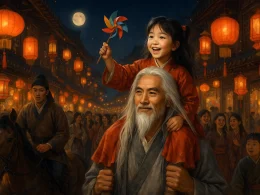The tower o’erlooks mountains without an end;
The lake in its wideness blends with the sky.
The wild geese carry my sorrow away;
The mountains bring the moon bright on high.
The clouds invite us to alight in their inn;
We pass round our cups in the celestial sphere.
Drunk, we’re wafted by the cooling breeze,
Swaying our sleeves as if we’re flying in the skies.
Original Poem
「与夏十二登岳阳楼」
李白
楼观岳阳尽,川迥洞庭开。
雁引愁心去,山衔好月来。
云间连下榻,天上接行杯。
醉后凉风起,吹人舞袖回。
Interpretation
Composed on an autumn night in 759 CE during the reign of Emperor Suzong, five years after the An Lushan Rebellion erupted, this poem reflects the Tang Dynasty's decline from prosperity to turmoil. Nearing sixty, Li Bai had experienced career setbacks—exile to Yelang due to involvement with Prince Li Lin's case, later pardon, and restless wandering in his later years, finding solace in nature. Written atop Yueyang Tower, the poem combines the lofty spirit of panoramic viewing with lament for turbulent times and rootless existence, while showcasing his uninhibited, transcendent heart that embraces nature.
First Couplet: "楼观岳阳尽,川迥洞庭开。"
Lóu guān Yuèyáng jìn, chuān jiǒng Dòngtíng kāi.
The tower overlooks Yueyang to the horizon; Rivers stretch far, Dongting Lake lies vast.
The opening couplet unfolds from an elevated perspective, depicting the broad view from the tower. "To the horizon" conveys the tower's height, offering a full panorama of Yueyang; "vast" captures Dongting Lake's expansiveness as rivers converge into its mighty waters. This couplet not only displays the poet's admiration for magnificent scenery but also implies a sense of life's vicissitudes when gazing down from heights.
Second Couplet: "雁引愁心去,山衔好月来。"
Yàn yǐn chóu xīn qù, shān xián hǎo yuè lái.
Wild geese carry my sorrow away; Mountains cradle the bright moon rising.
Here the poet infuses emotion into scenery, using wild geese to symbolize melancholy and expressing unfettered feelings. While geese often represent wanderers' homesickness, Li Bai subverts this, having them "carry sorrow away," revealing his free-spiritedness. "Mountains cradle the moon" personifies the scene with vibrant beauty, showcasing the poet's unique imagination.
Third Couplet: "云间连下榻,天上接行杯。"
Yún jiān lián xià tà, tiān shàng jiē xíng bēi.
Lodging connects to clouds above; Toasting reaches to the heavens.
This couplet radiates romanticism, reflecting the poet's "ethereal immortality" mindset. By Dongting Lake, Li Bai's transcendent spirit envisions "lodging in clouds" and "toasting in heaven," as if feasting with immortals. This illustrates his broad-mindedness and embodies Daoist "harmony between heaven and man," lending the poem a sublime quality.
Fourth Couplet: "醉后凉风起,吹人舞袖回。"
Zuì hòu liáng fēng qǐ, chuī rén wǔ xiù huí.
After wine, cool breezes rise, Swaying sleeves in dance.
The poem peaks here, showing the poet's graceful drunken demeanor. The lake breeze not only rustles sleeves but also mirrors his post-intoxication lightness. This image evokes Li Bai with flowing sleeves dancing in the wind, vividly capturing his bold spirit and immortal persona.
Holistic Appreciation
Starting with tower-top gazing, the poem gradually unfolds, blending scenery and emotion in clear layers. The opening magnificence portrays Yueyang Tower and Dongting Lake, followed by wild goose and moon imagery expressing transcendent feelings. The third couplet's unique imagination lends ethereal beauty, while the drunken dance conclusion showcases Li Bai's unfettered, sublime charm. Integrating description, emotion, and fantasy, the poem balances vast natural views with immortal fervor, truly embodying Li Bai's distinctive style.
Artistic Merits
- Expansive Vision, Grand Momentum: The opening "tower overlooks Yueyang to the horizon; rivers stretch far, Dongting Lake lies vast" establishes broad views and majestic momentum, creating a vast, powerful atmosphere through elevated perspectives.
- Emotion Infused into Scenery, Blended Mood: Beyond depicting Dongting Lake's grandeur, the poet imbues emotions—"wild geese carry sorrow away, mountains cradle the moon rising"—transforming melancholy into broad-mindedness through imagery.
- Unique Imagination, Romantic Freedom: "Lodging connects to clouds above; toasting reaches to the heavens" exemplifies extreme romantic imagination, envisioning cloud lodging and heavenly toasting for an immortal, transcendent effect.
- Dynamic Balance, Vivid Imagery: Skillfully combining movement and stillness enhances pictorial quality and rhythm. The front portion's panoramic views offer tranquility, while the latter's breezes and dancing sleeves create lively motion.
- Fluid Language, Harmonious Beauty: Concise, smooth language carries rhythmic elegance. "After wine, cool breezes rise, swaying sleeves in dance" depicts post-drink freedom with "dancing sleeves" showing wind flow. Parallel structure and bright rhythm enhance musicality.
Insights
This poem transcends mere praise of magnificent nature to reflect the poet's transcendent attitude toward life's vicissitudes. Despite personal setbacks and turbulent times, Li Bai finds spiritual solace between heaven and earth, dispelling sorrow through wine and embracing landscapes, demonstrating a broad-minded philosophy of life. This unfettered, all-embracing outlook offers wisdom for navigating life's fluctuations. Though his path was arduous, the poet maintained a free spirit—a spiritual realm worth remembering and emulating.
About the poet

Li Bai (李白), 701 - 762 A.D., whose ancestral home was in Gansu, was preceded by Li Guang, a general of the Han Dynasty. Tang poetry is one of the brightest constellations in the history of Chinese literature, and one of the brightest stars is Li Bai.












